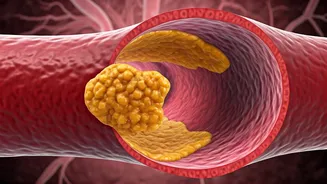Plaque Formation: Explained
Arterial plaques, which are primarily composed of cholesterol, fat, and other substances, progressively accumulate within the arteries' walls. These plaques narrow
the arteries, restricting blood flow to vital organs such as the heart and brain. This constriction can initiate a cascade of health issues. Factors like high cholesterol, high blood pressure, and smoking are significant contributors to plaque development. Over time, the accumulated plaques can solidify, leading to the risk of blood clots. If these plaques rupture, they can trigger blood clots, which could block arteries, potentially leading to strokes or heart attacks. A comprehensive understanding of plaque formation is key to adopt preventative strategies for maintaining cardiovascular health and longevity.
Risk Factors Involved
Numerous factors significantly increase the risk of plaque formation in the arteries. Elevated levels of LDL cholesterol, commonly known as 'bad' cholesterol, contribute substantially to plaque buildup. High blood pressure damages the arterial walls, creating sites where plaques can accumulate. Smoking introduces chemicals into the bloodstream, damaging blood vessels and accelerating plaque formation. Diabetes further exacerbates the issue by impairing blood vessel function and increasing the risk of inflammation. Genetic predisposition also plays a role, with family history of heart disease increasing the likelihood of developing plaques. Maintaining awareness and management of these risks are essential in preserving cardiovascular health, and preventative measures are often advised, depending on an individual's personal and familial health history.
Lifestyle Changes: Essential
Adopting heart-healthy lifestyle changes is vital for managing and potentially reversing arterial plaque. A balanced diet low in saturated and trans fats, high in fiber, fruits, and vegetables helps reduce cholesterol levels. Regular physical exercise, such as brisk walking, running, or swimming, can enhance cardiovascular health and improve blood flow. Quitting smoking is one of the most significant steps, as smoking damages blood vessels and accelerates plaque formation. Controlling stress through relaxation techniques like yoga or meditation can also contribute positively. Regular monitoring of blood pressure and cholesterol levels, alongside following any medical advice, is paramount to maintain heart health. These lifestyle modifications, along with medical guidance, are integral to potentially reversing plaque damage and enhancing overall well-being.
Dietary Strategies Detailed
A heart-healthy diet forms a cornerstone of strategies aimed at preventing or reversing arterial plaque. Emphasizing foods low in saturated and trans fats, which contribute to elevated cholesterol levels, is crucial. Including plenty of fiber-rich foods like whole grains, fruits, and vegetables can help lower cholesterol. Incorporating foods rich in omega-3 fatty acids, such as fatty fish like salmon and certain nuts and seeds, supports cardiovascular health. Limiting processed foods, sugary drinks, and excessive sodium intake can significantly reduce the risk of plaque formation. Consulting with a healthcare professional or registered dietitian for personalized dietary advice can help tailor a plan that meets specific needs, supporting heart health and overall wellness by making smart choices.
Exercise: Boosting Health
Regular physical exercise is a powerful tool in improving heart health and potentially reversing arterial plaque. Engaging in at least 150 minutes of moderate-intensity or 75 minutes of vigorous-intensity aerobic exercise each week can strengthen the cardiovascular system. Activities like brisk walking, jogging, cycling, and swimming effectively improve blood flow and reduce the risk of plaque buildup. Incorporating resistance training, such as weightlifting or bodyweight exercises, can further boost heart health by improving muscle mass and metabolism. Combining aerobic and resistance exercises offers a comprehensive approach. Before starting any new exercise routine, especially if you have existing health conditions, it's wise to consult with a healthcare provider for personalized recommendations that optimize heart health and overall fitness.
Medical Interventions Overview
In addition to lifestyle changes, certain medical interventions can help manage and, in some cases, reverse arterial plaque. Statins, a type of medication, are commonly prescribed to lower LDL cholesterol levels and reduce plaque formation. Other medications, like blood pressure-lowering drugs, can help to control blood pressure and protect blood vessels. In severe cases, where arteries are significantly blocked, procedures such as angioplasty or bypass surgery may be necessary to restore blood flow. These interventions should always be discussed with a healthcare professional to determine the most suitable approach based on the individual's specific health condition and risk factors. Regular medical check-ups and adherence to prescribed treatments are critical components of maintaining cardiovascular health.




















